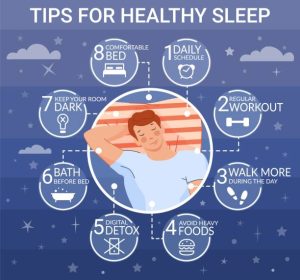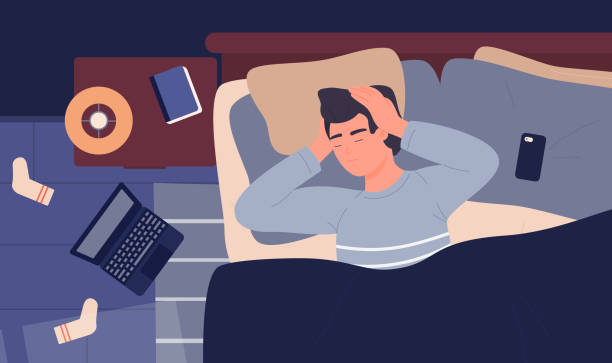Table of Contents
ToggleHave you ever spent hours staring at the ceiling, trying to will yourself to fall asleep, only to find yourself still wide awake come morning? If so, you’re not alone. Insomnia affects millions of people worldwide, and its negative impact on daily life is no joke. From increased stress and anxiety to decreased cognitive function, the effects of sleep deprivation can wreak havoc on both our physical and mental health.
So, whether you’re a chronic insomniac or just someone who occasionally struggles to drift off, this article is for you. Say goodbye to sleepless nights and hello to sweet, sweet slumber. Let’s get started!
Types of Insomnia
Insomnia is like that annoying mosquito buzzing around your head at night, but instead of just being a minor irritation, it can cause serious problems for your health and well-being.
Insomnia can manifest itself in a variety of ways, each with its own set of causes and symptoms. Acute insomnia lasts days or weeks due to stress, chronic insomnia lasts months/years from medical conditions or long-term stress.
There are two types of insomnia: onset insomnia (trouble falling asleep) and maintenance insomnia (frequent awakenings). Knowing these types helps identify symptoms and find solutions.
By understanding the different types of insomnia, you can better identify your own symptoms and take steps to address them.
Strategy 1: Establish a Sleep Routine

Importance of a Regular Sleep Routine
Establishing a regular sleep routine is one of the most effective strategies for overcoming insomnia. This is because the human body is designed to operate on a schedule, and regular sleep patterns help to regulate the body’s internal clock, making it easier to fall asleep and wake up feeling refreshed. Sticking to a consistent sleep routine can help to reduce stress and anxiety, as you know what to expect each night and can plan your day accordingly.
Practical Tips for Establishing a Sleep Routine
So, how can you establish a sleep routine that works for you? The first step is to set a consistent bedtime and wake-up time. This means going to bed and waking up at the same time every day, even on weekends. It can also be helpful to create a relaxing bedtime routine that signals to your body that it’s time to wind down for the night. This might include taking a warm bath, reading a book, or practicing relaxation techniques such as meditation or deep breathing exercises.
To establish a sleep routine, avoid caffeine, alcohol, and nicotine before bedtime. Create a comfortable sleep environment—dark, cool, and quiet. By following these tips, you’ll enjoy the benefits of a good night’s sleep.
Strategy 2: Create a Relaxing Sleep Environment

A relaxing sleep environment can be a game-changer for those struggling with insomnia. The atmosphere in which you sleep plays a crucial role in how easily you fall asleep and how restful your sleep is. Creating a relaxing sleep environment involves removing distractions and creating a calming atmosphere that will help you wind down before bed.
Importance of a Relaxing Sleep Environment
Creating a relaxing sleep environment can help reduce stress and anxiety, two of the most common causes of insomnia. A calming atmosphere can also help promote a sense of relaxation and well-being, making it easier to fall asleep and stay asleep throughout the night.
Tips for Creating a Relaxing Sleep Environment
There are a few simple steps you can take to create a relaxing sleep environment. First, keep your bedroom cool and dark, as this can help your body prepare for sleep. Consider investing in blackout curtains or an eye mask to block out any light that may interfere with your sleep. You may also want to invest in a comfortable mattress and pillows to ensure that you are comfortable throughout the night. Finally, consider removing any electronics from your bedroom, as the blue light emitted by screens can interfere with your body’s natural sleep-wake cycle.
Strategy 3: Limit Stimulants Before Bed

If you’re struggling with insomnia, it’s important to take a look at your daily habits and see if any factors might be keeping you up at night. One common culprit is stimulants, which can interfere with your body’s natural sleep cycle and make it difficult to fall asleep.
Impact of Stimulants on Sleep
Stimulants such as caffeine, nicotine, and alcohol can all hurt sleep. Caffeine, in particular, is a powerful stimulant that can stay in your system for up to six hours after consumption. This means that even if you don’t feel the effects of your morning cup of coffee anymore, it could still be keeping you up at night. Nicotine and alcohol can also interfere with sleep quality and lead to nighttime waking.
Practical Tips for Limiting Stimulants Before Bed
To improve your sleep quality, it’s important to limit your intake of stimulants before bed. This means avoiding caffeine, nicotine, and alcohol in the evening hours. You may also want to consider limiting your exposure to electronic devices, such as smartphones and laptops, which emit blue light that can interfere with your body’s natural sleep cycle. Instead, try winding down with a relaxing activity, such as reading a book or taking a warm bath, to help prepare your mind and body for sleep. By taking these steps to limit stimulants before bed, you can help ensure a more restful night’s sleep.
Strategy 4: Practice Relaxation Techniques

One effective strategy for overcoming insomnia is to practice relaxation techniques. Relaxation techniques can help to calm your mind and body, reducing stress and anxiety and making it easier to fall asleep and stay asleep. There are several different relaxation techniques that you can try, including meditation, deep breathing exercises, and progressive muscle relaxation.
Benefits of Relaxation Techniques on Sleep
Relaxation techniques have been shown to have numerous benefits on sleep. They can help to reduce the amount of time it takes to fall asleep, improve sleep quality, and reduce the number of awakenings during the night. By practicing relaxation techniques, you can also reduce feelings of stress and anxiety.
Practical Tips for Practicing Relaxation Techniques
If you’re new to relaxation techniques, there are several practical tips you can follow to help you get started. First, find a quiet and comfortable place where you won’t be disturbed. Then, try practicing deep breathing exercises by inhaling through your nose for a count of four, holding your breath for a count of seven, and exhaling through your mouth for a count of eight. Alternatively, try a guided meditation or progressive muscle relaxation exercise. By practicing relaxation techniques regularly, you may find that you’re able to overcome insomnia and enjoy a better night’s sleep.
Strategy 5: Incorporate Physical Activity

Physical activity is not only good for your overall health but can also help you get a better night’s sleep. Regular exercise has been shown to improve sleep quality, increase total sleep time, and decrease the time it takes to fall asleep. Exercising too close to bedtime can have the opposite effect and make it harder to fall asleep.
The Impact of Physical Activity on Sleep
Physical activity has been shown to reduce stress and anxiety, two common causes of insomnia. Exercise also helps regulate the body’s internal clock, known as the circadian rhythm, which can help you fall asleep more easily and wake up feeling more refreshed. Exercise can improve sleep quality by easing sleep apnea and restless leg syndrome symptoms.
Practical Tips for Incorporating Physical Activity into Daily Life
Incorporating physical activity into your daily routine doesn’t have to be complicated. Even a short walk during your lunch break or taking the stairs instead of the elevator can make a difference. Aim for at least 30 minutes of moderate-intensity exercise most days of the week, such as brisk walking, cycling, or swimming.
Finish workout hours before sleep to let the body cool down and prepare for rest.
Strategy 6: Cognitive Behavioral Therapy for Insomnia (CBT-I)
Benefits of CBT-I

Cognitive Behavioral Therapy for Insomnia, or CBT-I, is a talk therapy that focuses on changing negative thoughts and behaviors related to sleep. CBT-I targets insomnia’s root causes and offers lasting relief, without the side effects of medication. CBT-I is an effective treatment for chronic insomnia, and can also improve symptoms of depression and anxiety.
How CBT-I Works
CBT-I typically involves several weekly sessions with a therapist who will help you identify negative thoughts and behaviors related to sleep. You may be asked to keep a sleep diary to track your sleep patterns and identify patterns of negative thinking or behavior. The therapist creates a tailored treatment plan with relaxation, stimulus control, and sleep restriction techniques.
Relaxation training instructs individuals on utilizing techniques like deep breathing to facilitate easier relaxation and sleep initiation. Stimulus control entails modifying one’s sleep environment and bedtime routine to establish a mental association between the bed and sleep. Sleep restriction involves limiting the time spent in bed to align with actual sleep duration, thereby enhancing sleep quality and reducing sleep onset latency.
Strategy 7: Consult a Healthcare Professional

When it comes to tackling insomnia, sometimes it takes more than just implementing lifestyle changes or trying home remedies. That’s where healthcare professionals can come in, providing expert guidance and treatment options to help you get the restful sleep you need. Chronic insomnia warrants consulting a healthcare professional for potential underlying medical issues.
Importance of Consulting a Healthcare Professional
Healthcare professionals can identify and treat the root cause of your insomnia. They can also help monitor your progress and make adjustments as needed to ensure you’re getting the best possible care.
Types of Healthcare Professionals
Healthcare professionals for insomnia include primary care physicians, sleep specialists, therapists, and psychiatrists. Primary care physicians can perform a physical exam and provide referrals to specialists if needed. Sleep medicine specialists can conduct sleep studies and provide treatment options such as medication or specialized therapies. Mental health professionals can help address underlying psychological factors that may be contributing to insomnia, such as anxiety or depression.









